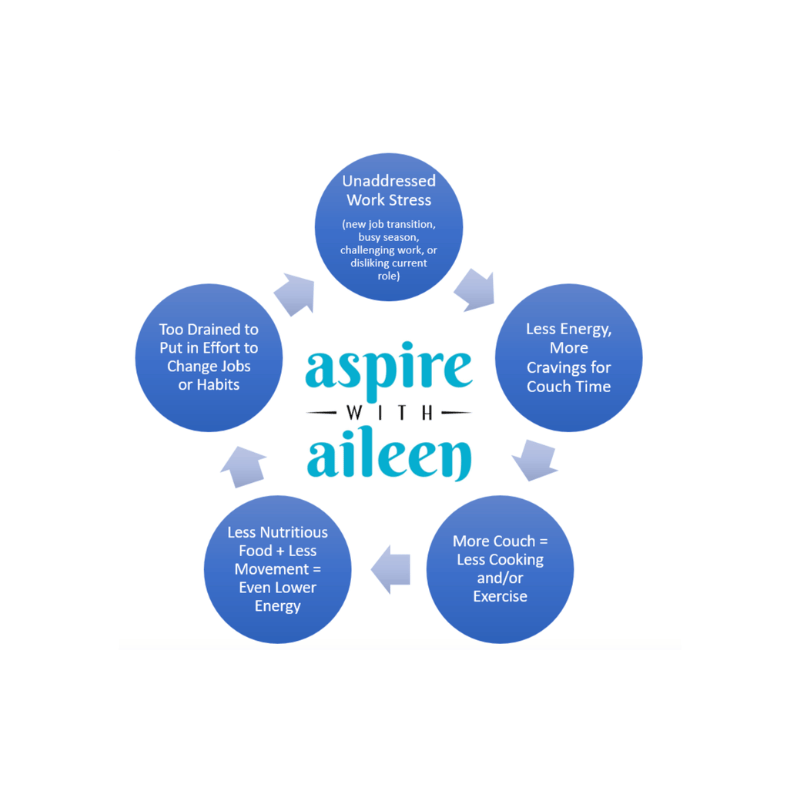The calendar starts fresh.
There is a lot of that “New Year, New You” vernacular out there and a wiry energy abounds… but we all know that the holiday season is not exactly recharging for most adults (I’m especially looking at you, parents of young kids!).
With all the talk of creating new habits and setting goals, you may wonder how anyone manages when you’re just trying to stay afloat.
If that sentiment resonates for you, you may be burnt out.
Some other traditional warning signs of burnout, as per the OG psychologist on the matter, Herbert Freudenberger, are:
Depersonalization
Decreased sense of accomplishment
Emotional exhaustion
Whether you’re burned out or “simply” experiencing the stress that comes with being in a job you don’t want to be in anymore, energy is a finite resource either way.
So, what do you do with this Catch-22:
You need energy to look for a new job, but your current job is taking your energy?
Four tips for job searching when you’re feeling burnt out:
commit to calming your nervous system
It may sound counterintuitive, but I recommend starting by NOT going all in on job boards and applications. This is how approximately 99% of my clients begin their search before we work together 😊 This approach can easily become a time suck – here’s how it often plays out:
You sit down in front of your computer thinking, “Okay here we go, job search time!” and then three hours and 30 open browser tabs later you are left questioning what you’ve accomplished. Maybe you started with clicking a link for an open position, which led you to look up the company on LinkedIn, which led you to click on an employee profile to learn more, which brought you to another company page, which…. you get the point. Long story short: before you know it, lots of time and energy have been expended... both of which you typically don’t have an excess of if you’re burnt out.
Start, instead, by becoming militant about your stress management.
This doesn’t mean you need to spend all day everyday meditating. What I mean is, take the step of discovering (or simply recognizing) which activities help you feel like your best self. I’m talking your tried-and-true go-to stress reducing strategies – the things you either already do (or could integrate more), and commit to prioritizing them even when adding a job search to your plate.
Are you feeling so far down the burnout cycle that you don’t even know what helps you feel better?
I’m obsessed with the book Burnout: The Secret to Unlocking the Stress Cycle by Emily and Amelia Nagoski. These are their 6 evidence-based strategies to turn OFF your stress cycle and turn ON your rest and repair mode. The good news? They’re all simple, free, and doable (and they work!).
A related note for business owners or if you have to plan a lot of content in your work: Tracy Stanger has a Planning Your Year program that I did for 2023. One thing I love is that she has you input your down-time and personal commitments FIRST. We all know those can easily get kicked to the curb, so prioritizing them first then making the rest of your life fit around it is the kind of anti-hustle counter-culture messaging the world needs.
Believe in Boundaries
We’ve all heard about the power of saying no by now, and if you’re burned out you have FULL permission to scale back your committments and expectations of yourself.
When you feel like you’re treading water, tell yourself that staying afloat is enough.
No need for any fancy swim strokes.
In addition to saying no and taking pressure off of yourself, explore creating boundaries at your current job to mitigate additional stress (if possible!).
I love this breakdown of 10 traits of an anti-burnout employee.
If you work from home and feel like work just bleeds into all of your time, these simple strategies can help create both literal and metaphorical space between you and your work.
control what you can control
Along those lines, what are the additional sources of stress in your life? There are plennnnty of stressors we have zero control over (hence my strong nudge to double down on the stress reducing coping strategies). But, which might you have some control over reducing?
For example:
A. Are you surrounded by negative people – otherwise known as energy vampires – and is there room to distance yourself from them? Here are 6 strategies to protect your energy.
B. Do you feel exhausted every time the alarm goes off in the morning and if so, is there any wiggle room in your control to go to bed earlier? Create a wind down routine to help “land the plane” of your brain before bed? Here are other reasons why you may be so tired (and what to do about it).
C. Are you stress-scrolling and spending time (the same time you feel like you don’t have enough of!) getting sucked into a comparison trap on social media? Here are some free resources to create more screen life balance.
know, and keep coming back to, your why
What is driving you to make a change?
What kind of impact would it have to stay where you are and not put energy towards this new role?
If you land what you’re looking for - how will life look differently for you / your family / your friends?
Being clear about these answwers and having these bigger picture drivers in mind can help you keep perspective and stay resilient through the process.
I hope these strategies serve you in restoring and protecting your energy, so you can land work you love!


